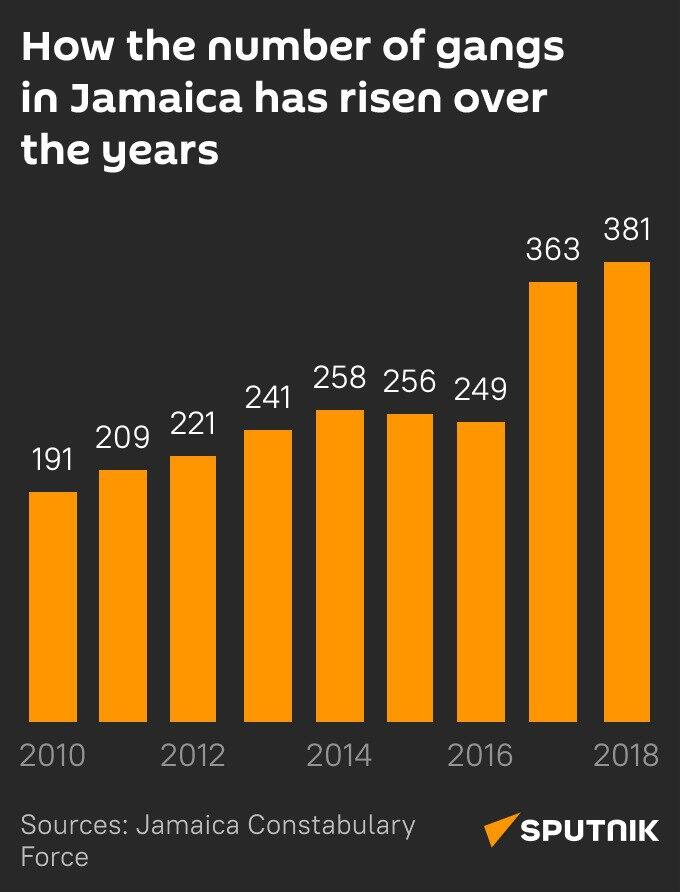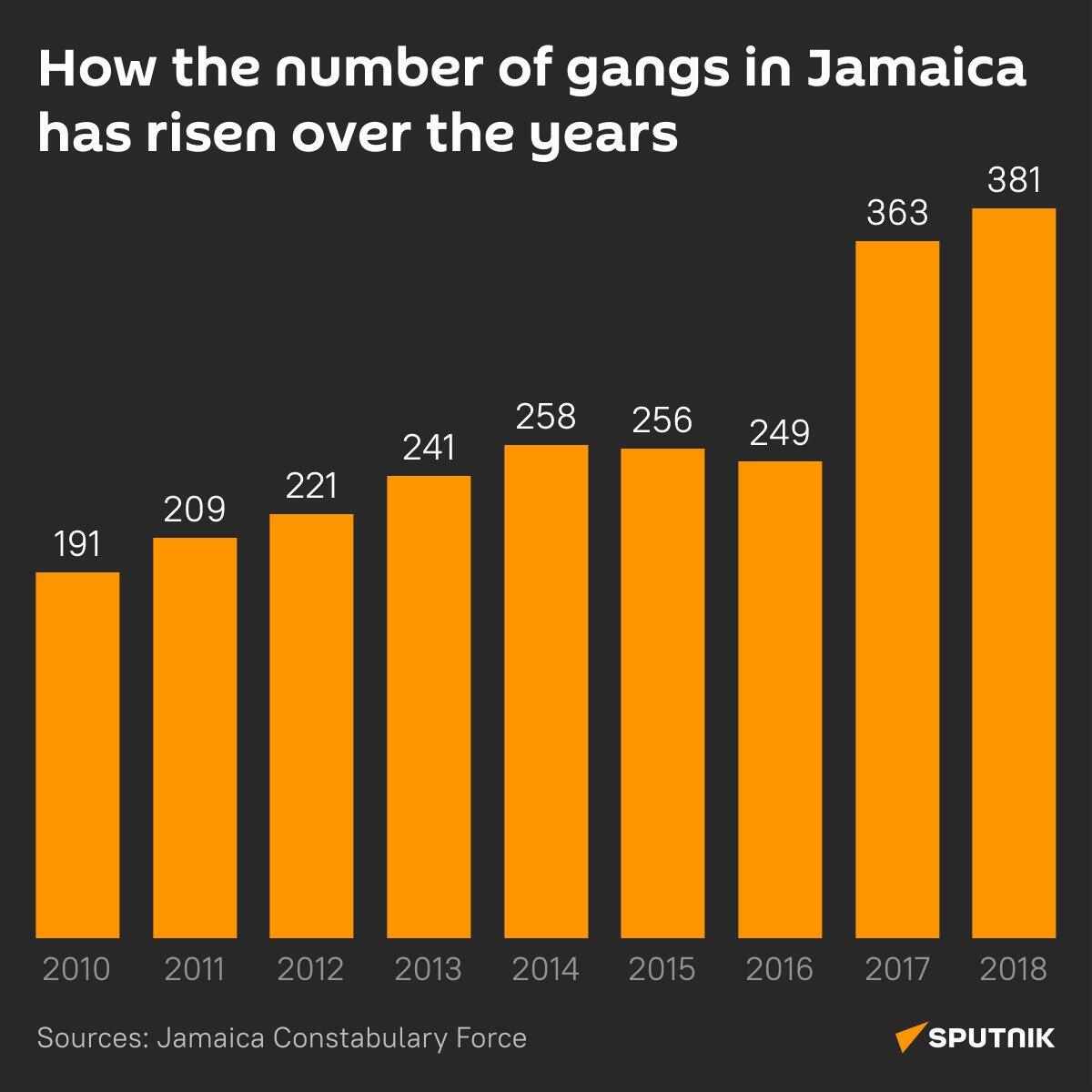https://sputnikglobe.com/20221116/jamaica-declares-public-emergency-as-country-struggles-with-gang-violence-1104287356.html
Jamaica Declares Public Emergency as Country Struggles With Gang Violence
Jamaica Declares Public Emergency as Country Struggles With Gang Violence
Sputnik International
Jamaica is struggling with an onslaught of gangs and gangs-related crimes. According to police data, organized crime is responsible for 71% of all murders on... 16.11.2022, Sputnik International
2022-11-16T14:07+0000
2022-11-16T14:07+0000
2022-12-08T16:32+0000
world
gang
jamaica
police
crime
https://cdn1.img.sputnikglobe.com/img/07e6/0b/10/1104294943_0:225:2843:1824_1920x0_80_0_0_fc79c5b7e2436613b844f52a11be1bb9.jpg
Andrew Holness, Prime Minister of Jamaica, declared a state of public emergency in the capital and several parishes of the country in the wake of soaring gang crimes. This decision grants police new powers, including the permission to arrest citizens without warrants and search buildings without permission.The gang problem is not new for Jamaica. According to data, provided by Caribbean Policy Research Institute, since 1970`s per capita murder increased each year by approximately 4.4%.While in 1977 this rate was 19.8 per 100,000, in 2017 it reached 60 per 100,000. The majority of these murders can be attributed to gangs. As experts indicate, in 2009 gangs were already responsible for around 52% of all murders on Jamaica.The sociological portrait of the typical gang member, according to experts, is the following: a male under age 35, from an economically-challenged community, who is undereducated and not officially employed.Generally, new members of the gangs are recruited at a young age. Gangs position themselves near schools in order to impress young boys and lure them in.The number of gangs is also increasing every year. The most infamous gangs are the Klansman Gang, One Order Gang and Rat Bat gang.Mostly, this gangs are situated in capital Kingston and St. Andrew parish. These groups are involved in a vast variety of illegal activities, including narcotics sales, prostitution and assassinations.Among other things, the extortion racket and lottery scams account for a solid slice of gang revenue. According to the US State Department, American tourists lose about $300 mln on the so-called Jamaican lottery scam each year. This scam has criminals befriending the potential victim, and then convincing them that they won a lottery, but will have to make initial payment to unblock the money they won.The Jamaican government has been trying to beat organized crime for quite some time. In February 2022, Jamaica's Supreme Court tried dozens of alleged gang members. They were charged with arson, murder and criminal racketeering. The trial shocked the nation with its graphic depictions of gang crimes. For instance, the accused bragged to each other about murdering rivals. This trial became possible thanks to a reform of the criminal code, with the government introducing amendments that allowed for witnesses to not identify themselves by name. Also judges were given the power to convict based on a wider range of offenses. Violent crime has sky-rocketed in recent years, since the Jamaican economy, which once heavily relied on tourists, was hit by Covid pandemic.
jamaica
Sputnik International
feedback@sputniknews.com
+74956456601
MIA „Rossiya Segodnya“
2022
News
en_EN
Sputnik International
feedback@sputniknews.com
+74956456601
MIA „Rossiya Segodnya“
Sputnik International
feedback@sputniknews.com
+74956456601
MIA „Rossiya Segodnya“
jamaica, police, gangs, law, trial
jamaica, police, gangs, law, trial
Jamaica Declares Public Emergency as Country Struggles With Gang Violence
14:07 GMT 16.11.2022 (Updated: 16:32 GMT 08.12.2022) Jamaica is struggling with an onslaught of gangs and gangs-related crimes. According to police data, organized crime is responsible for 71% of all murders on the island.
Andrew Holness, Prime Minister of Jamaica, declared a state of public emergency in the capital and several parishes of the country in the wake of soaring
gang crimes.
This decision grants
police new powers, including the permission to arrest citizens without warrants and search buildings without permission.
“We have seen an increase in criminal activities in these areas and a threat to property and in some instances public disorder,” Holness said amid the announcement.
The gang problem is not new for
Jamaica. According to data,
provided by Caribbean Policy Research Institute, since 1970`s per capita murder increased each year by approximately 4.4%.
While in 1977 this rate was 19.8 per 100,000, in 2017 it reached 60 per 100,000. The majority of these murders can be attributed to gangs. As experts
indicate, in 2009 gangs were already responsible for around 52% of all murders on Jamaica.
The sociological portrait of the typical gang member, according to experts, is the following: a male under age 35, from an economically-challenged community, who is undereducated and not officially employed.
Generally, new members of the gangs are recruited at a young age. Gangs position themselves near schools in order to impress young boys and lure them in.
The number of gangs is also increasing every year. The most infamous gangs are the Klansman Gang, One Order Gang and Rat Bat gang.
Mostly, this gangs are situated in capital Kingston and St. Andrew parish. These groups are involved in a vast variety of
illegal activities, including narcotics sales, prostitution and assassinations.
Among other things, the extortion racket and lottery scams account for a solid slice of gang revenue. According to the US State Department, American tourists lose about $300 mln on the so-called Jamaican lottery scam each year. This scam has criminals befriending the potential victim, and then convincing them that they won a lottery, but will have to make initial payment to unblock the money they won.
The Jamaican government has been trying to beat organized crime for quite some time. In February 2022, Jamaica's Supreme Court tried dozens of alleged gang members. They were charged with arson, murder and criminal racketeering. The trial shocked the nation with its graphic depictions of gang crimes. For instance, the accused bragged to each other about murdering rivals.
This trial became possible thanks to a reform of the criminal code, with the government introducing amendments that allowed for witnesses to not identify themselves by name. Also judges were given the power to convict based on a wider range of offenses.
Violent crime has sky-rocketed in recent years, since the Jamaican economy, which once heavily relied on tourists, was hit by Covid pandemic.



